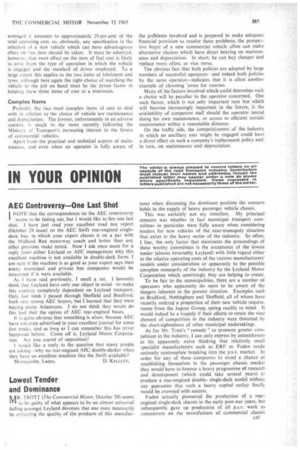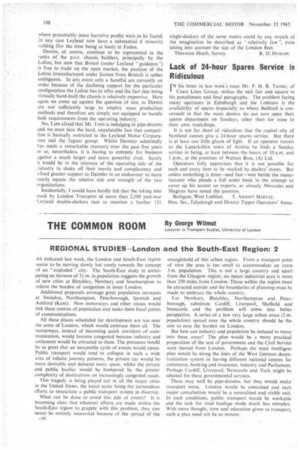IN YOUR OPINION
Page 187

Page 188

If you've noticed an error in this article please click here to report it so we can fix it.
AEC Controversy One Last Shot
11 NOTE that the correspOndence on the AEC controversy I seems to be fading out, but I would like to fire one last shot. I have just read your excellent road test report (October 29 issue) on the AEC Swift rear-engined singledeck bus, in which your expert classes it on a par with the Midland Red motorway coach and better than any other previous make tested. Now I ask once more for a reply from either Leyland or AEC management why this excellent machine is not available in double-deck form. I am sure if the machine is as good as your expert says then tmany municipal and private bus companies would be interested if it were available.
As I have said previously, I smell a rat. I honestly think that Leyland have only one object in mind—to make this country completely dependent on Leyland transport. Only last week I passed through Sheffield and Bradford, both very strong AEC buyers, but I learned that they were buying many Atlanteans. I do not think they would do this had they the option of AEC rear-engined buses.
It is quite obvious that something is afoot, because AEC have not even advertised in your excellent journal for some five weeks, and as long as I can remember this has never happened before. Come off it, Leyland Motor Corporation. Are you scared of opposition?
I would like a reply to the question that many people are asking—why no rear-engined AEC double-decker when they have an excellent machine like the Swift available?
Morecambe, Lancs. D. KELLETT.
Lowest Tender and Dominance
AA R. TROTT (The Commercial Motor, October 29) seems "I to be guilty of what appears to be an almost universal failing amongst Leyland devotees that one must necessarily be criticizing the quality of the products of this manufac
turer when discussing the dominant position the concern holds in the supply of heavy passenger vehicle chassis.
This was certainly not my intention. My principal concern was whether in fact municipal transport committees in particular were 'fully aware when considering tenders for new vehicles of the near-monopoly situation that exists in the heavy sector of the industry. So often, I fear, the only factor that dominates the proceedings of these worthy committees is the acceptance of the lowest tender (almost invariably Leyland) with little regard either to the relative operating costs of the various manufacturers' models under consideration or apparently to the possible complete monopoly of the industry by the Leyland Motor Corporation which unwittingly they are helping to create.
To be fair to the municipalities, there are a number of operators who apparently do seem to be aware of the dangers inherent in the present situation. Examples such as Bradford, Nottingham and Sheffield, all of whom have recently ordered a proportion of their new vehicle requirements from the Jaguar Group, spring readily to mind. it would indeed be a tragedy if their efforts to retain the vital element of competition in the industry were thwarted by the short-sightedness of other municipal undertakings.
As for Mr. Trott's " remedy " to promote greater competition in the industry, I can only express by astonishment at his apparently naive thinking that relatively small specialist manufacturers such as ERF or Foden could seriously contemplate breaking into the p.s.v. market. In order for any of these companies to stand a chance of establishing themselves in the passenger chassis market they would have to finance a heavy programme of research and development (which could take several years) to produce a rear-engined doublesingle-deck model without any guarantee that such a heavy capital outlay finally would be crowned with success, Foden actually pioneered the production of a rearengined single-deck chassis in the early post-war years, but subsequently gave up production of all p.s.v. work to concentrate on the manufacture of commercial chassis where presumably more lucrative nroffts were to be found. In any case Leyland now have a substantial if minority aolding (for the time being at least) in Foden.
Dennis, of course, continue to be represented in the ranks of the p.s.v. chassis builders, principally by the Loline, but now that Bristol (under Leyland "guidance ") is free to trade on the open market, the position of the Loline (manufactured under licence from Bristol) is rather ambiguous. In any event only a handful are currently on order because of the declining support for the particular configuration the Loline has to offer and the fact that being virtually hand-built the chassis is relatively expensive. Here again we come up against the question of size, as Dennis are not sufficiently large to employ. mass production methods and therefore are simply not equipped to handle bulk requirements from the operating industry.
No, I am afraid that Mr. Trott is indulging in pipe-dreams and we must face the hard, unpalatable fact that competition is basically restricted to the Leyland Motor Corporation and the Jaguar group. Whilst Daimler admittedly has made a remarkable recovery over the past five years or so, nevertheless, it is having to compete for business against a much larger and more powerful rival. Surely it would be in the interests of the operating side of the iadustry to shake off their inertia and complacency and afford greater support to Daimler in an endeavour to more nearly equate the relative size and strength of the two organizations.
Incidentally, I would have hardly felt that the taking into stock by London Transport of more than 2,100 post-war Leyland double-deckers (not to mention a further 131 single-deckers of the same make) could by any stretch of the imagination be described as "relatively few ", even taking into account the size of the London fleet.
Thornton Heath, Surrey. R. D. HysLoP.
Lack of 24-hour Spares Service is Ridiculous
IN his letter in last week's issue Mr. P. H. R. Turner, of I Coast Lines. G roup, strikes the nail fair and square in his penultimate and final paragraphs. = The problem facing many operators in Edinburgh and the Lothians is the availability of spares (especially so where Bedford is concerned) in that the main dealers do not now open their spares department on Sundays, other than for issue to their own workshops.
It is not far short of ridiculous that the capital city of Scotland cannot give a 24-hour spares service. But there is at least one little gleam of light. If an operator travels to the Lanarkshire town' of Airdrie he finds a Sunday service in being, at least between the hours of 10 a.m. and 1 p.m., at the premises of Watson Bros. (A) Ltd.
Operators fully appreciate that it is not possible for each and every item to be stocked by dealers' stores. But unless something is done—and fast—woe betide the manufacturer who pleads a full order book in the attempt to cover up his accent on exports, as already Mercedes and Magirus have noted the -position.
Bathgate, West Lothian. T. ARNOTT MOFFAT.
Hon. Sec., Edinburgh and District Tipper Operators' Assoc.
































































































































































































































































